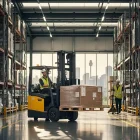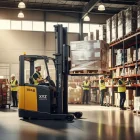In light of recent projections indicating a slowdown in the construction industry, with growth rates dipping to just over 1% by 2025, it’s more important than ever for businesses to consider how to efficiently manage their operations during challenging economic times. As margins tighten due to factors like tighter credit conditions, rising construction input costs, and a decline in commercial property values, businesses involved in construction and logistic operations—such as those needing forklift equipment—must find ways to adapt. This blog post aims to provide insightful strategies for these businesses, with particular attention to forklift hiring, servicing, and repairs in Sydney.
Cost-Efficiency through Forklift Hire
The anticipated flatlining in spending on commercial facilities suggests that businesses will need to be more mindful of their capital expenditure. Opting for forklift hire in Sydney can be a judicious decision in this context. Instead of committing to large purchases, hiring forklifts allows for flexibility and cost control. You pay for the machinery as you need it, without the long-term financial commitment. This strategy also reduces the risk associated with a decrease in the frequency of construction projects, ensuring you’re not left with idle equipment that’s depreciating in value.
Maintaining Operations with Forklift Servicing and Repairs
During economic downturns, maintaining your existing equipment becomes crucial to avoid unnecessary downtimes and extend the lifespan of your investment. Regular forklift servicing in Sydney ensures that your equipment stays in optimal condition, which in turn supports productivity on-site. Swift and efficient forklift repairs are equally important, minimizing delays caused by equipment malfunctions. When choosing a provider for servicing and repairs, look for those offering comprehensive and transparent services, prioritizing your operational continuity.
Diesel forklift Vs Electric Forklift – Making the Right Choice
Depending on the nature of your projects, choosing between a diesel and an electric forklift can have significant implications for your operation’s efficiency and cost-effectiveness. Diesel forklifts continue to be favoured for heavy lifting and outdoor use due to their robust performance. However, electric forklifts shine in indoor environments, and as energy costs and environmental considerations become increasingly important, they present an economical and sustainable alternative. Assessing your specific needs will guide you to the right choice, balancing initial costs with long-term savings.
The Role of Toyota Forklift in Economic Adaptation
As businesses navigate through a period where construction starts have slowed dramatically, investing in reliable and industry-leading equipment is more vital than ever. A Toyota forklift is synonymous with durability and performance, which may translate into fewer repairs and a longer life cycle—even in challenging times such as these. Although not endorsing any particular brand, it’s worth noting that choosing well-established brands can often lead to long-term cost savings due to better build quality and accessible parts for servicing.
Strategies to Weather the Slowdown
1. Assess and plan your forklift needs based on project demand—consider forklift hire to match the project scale and duration.
2. Emphasize regular maintenance and quick repairs to avoid loss of productivity.
3. Consider the operational environment and tasks to determine whether diesel or electric forklifts are more cost-effective for you.
4. Explore financing options for forklifts that spread out costs and avoid large initial capital outlay.
Conclusion
While the slowdown in the construction industry presents its challenges, it also compels businesses to seek out smarter and more adaptable operational strategies. Forklift hire in Sydney can mitigate financial risks, and prioritising servicing and repairs ensures your equipment remains reliable when you need it most. Finally, consider the long-term economic and environmental benefits when choosing between a diesel or electric forklift for your next project. By approaching the projected industry trends proactively, your business can remain resilient and responsive, ready to take on the opportunities that arise even during slower economic times.




